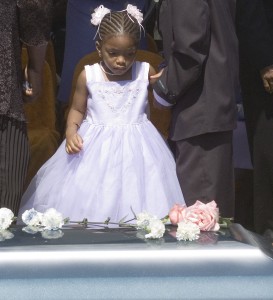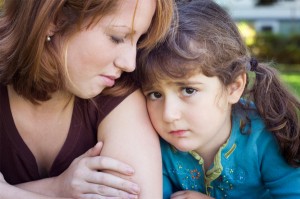Grief and Loss
Myths and Facts in Grief in Children
Children experience grief and loss at all ages. Even infants will grieve. Young children can obviously express grief differently than adults. Also, as children mature, the way they show grief changes as well. Therefore, it can be very easy to feel confused about children and grief. Just remember that children will usually learn about grief, as well as learn how to cope with grief, through watching adults. Here are some myths and facts about children and the grief process:
Myth:
Young children do not grieve, and infants don not grieve at all.
Fact:
- Kids, even infants, do grieve.
- It is important for kids to grieve and express their emotions.
- A grab bag of emotions may be displayed in the child, even ones you may not think are emotions connected with grieving.
- Many factors affect the grieving of a child, including the family situation, stability, health and mood of the child before the loss.
- Children’s feelings need to be recognized as they grieve. Ignoring children’s questions or behavior will not make their pain go away.
Myth:
Children do not grieve as deeply as adults.
Fact:
- Children do not react the same as adults when they know someone has died, but that does not mean children are not seriously affected by the loss.
- A death can cause a huge fear of abandonment in a child.
- Children need a safe environment with many hugs, loves and permission to express their feelings.
- Suppressed grief can lead to emotional and behavioral problems, so encourage children to feel, talk and/or draw pictures of their emotions.
- Suppressed grief can bring physical and emotional problems later in life.
Myth:
Children are lucky because they are too young to understand death.
Fact:
- Remember, children lack life experiences to draw on to make the death easier to understand. They likely only know about death through the television, which is not death in their life at this moment.
- Children have limited “tools” to express their grief. Adults know feelings and how to communicate them better than children.
- Death is new to children.
Myth:
Children should be protected from the pain of death and retain their innocence.
Fact:
- Death is part of a child’s life, especially in many TV shows, movies, and video games. However they need to learn that death is permanent, and it does not solve any problems.
- Children do experience death through the loss of pets, family members, friends and people at school. So if you do not talk about the loss, they will think you are hiding something from them.
- Children will use their own imaginations to fill in gaps about the death if they are not talked to about the loss. Their imaginations might be scarier than real life.
- Children who are not included in the grieving and burial rituals lose the opportunity to learn and be part of family events. Children learn from adults how to act, behave and express emotions.
- Children who are not included in the death process can develop anxiety and may get resentful. Children are very aware of their surroundings, and of the feelings of those around them, especially regarding adults they care about.
Myth:
Children can forget the death easily and grieve quickly.
Fact:
- Children are like adults. They grieve on their own time. The death becomes part of their lives, and how they perceive the loss changes with time.
- Coping with loss is important for children to experience. This can take different amounts of time, depending on the child.
- Keeping a connection with the loved one is important, even if it is symbolic.
- Children grieve differently depending on their age, background, relationship, and many other factors.
Remember, children may not look like they are grieving the way adults do, but rest assured they are assimilating the event, and learning new things about loss every day.
Are you looking for others with whom you can relate? Please be sure to visit our grief message boards to connect with others who are on similar grief journeys.
© 2010 Kelasan, Inc.






